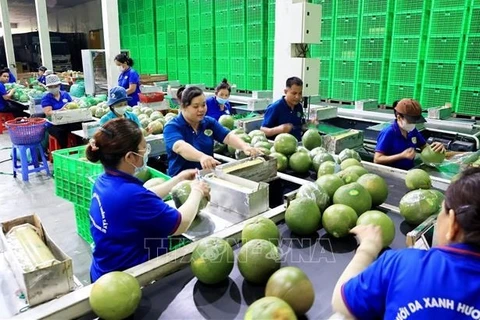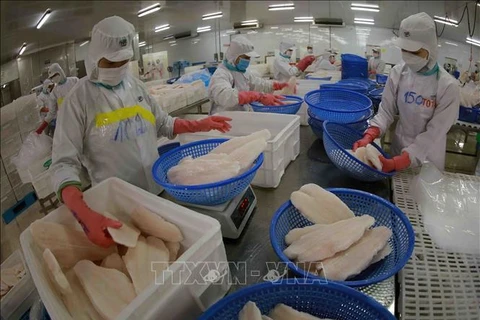Hanoi (VNS/VNA) - Vietnam's exports to the EU and the US in 2023 were estimated to reach around 166 billion USD, a 9.6% decrease while imports were estimated at nearly 41 billion USD, a 9.1% drop in comparison to 2022.
The Southeast Asian economy's trade surplus, however, remained positive at 125 billion USD this year, including 33 billion USD with the EU and 92 billion USD with the US.
"With a large open economy, Vietnam's import-export activities are directly affected by the global economic downturn in the first half of 2023 and the slow and uneven recovery of world economies in the second half of 2023," said Ta Hoang Linh, Director of the European and American Market Department under the Ministry of Industry and Trade (MoIT).
In the first 10 months of 2023, the EU reduced its imports from non-EU markets by nearly 16%, and the US reduced its imports from foreign markets by 6%. Despite inflation being somewhat contained, it remained high, coupled with pressures from geopolitical instability, and profound changes in behaviour and consumption habits in the EU and the US, making it challenging to sustain a high level of import, according to a recent report by the IMF.
Vietnam's export turnover to the EU and US saw a sharp decrease with exports to the EU reaching 43.7 billion USD, a 6.7% decrease year-on-year, while exports to the US reaching 96.9 billion USD, a 12.4% decrease year-on-year. Only exports to the UK, countries in the Eurasian Economic Union (EAEU), countries in the Southern Common Market (Mercosur), and some smaller markets witnessed growth of 3.1%, 12.7%, and 10%, respectively.
Major export items, including machinery, equipment, spare parts; phones, computers, and components; computers, electronic products, and components; textiles; leather shoes and bags; wood and wood products; and seafood, have all seen an average decrease of over 10% compared to 2022.
Meanwhile, some other items have seen good growth including cameras, camcorders, and components increased by 27%; various types of iron and steel increased by 23.5%. Particularly, some agricultural products such as rice increased by 53.3%; cashews increased by 10.2%; fruits and vegetables increased by 10.2%.
While trade has been slowing down, thanks to effective FTAs with European and American market partners, including the EVFTA, CPTPP, and UKFTA, the positive impact continues, maintaining Vietnam's advantages in trade and investment activities in 2024.
Regarding trade promotion, Tran Thu Quynh, Vietnamese Commercial Counsellor in Canada, said that among CPTPP member countries, Vietnam had very good leverage to accelerate the export of goods to Canada with the estimated export to Canada in 2023 at over 5.7 billion USD.
Linh said that the European and American Market Department would closely monitor the market, and promptly grasp information about the economic, political, and policy situation in the region and globally affecting trade with Vietnam. This would enable early warnings to the business community and provide policy recommendations to the government for appropriate responses./.
The Southeast Asian economy's trade surplus, however, remained positive at 125 billion USD this year, including 33 billion USD with the EU and 92 billion USD with the US.
"With a large open economy, Vietnam's import-export activities are directly affected by the global economic downturn in the first half of 2023 and the slow and uneven recovery of world economies in the second half of 2023," said Ta Hoang Linh, Director of the European and American Market Department under the Ministry of Industry and Trade (MoIT).
In the first 10 months of 2023, the EU reduced its imports from non-EU markets by nearly 16%, and the US reduced its imports from foreign markets by 6%. Despite inflation being somewhat contained, it remained high, coupled with pressures from geopolitical instability, and profound changes in behaviour and consumption habits in the EU and the US, making it challenging to sustain a high level of import, according to a recent report by the IMF.
Vietnam's export turnover to the EU and US saw a sharp decrease with exports to the EU reaching 43.7 billion USD, a 6.7% decrease year-on-year, while exports to the US reaching 96.9 billion USD, a 12.4% decrease year-on-year. Only exports to the UK, countries in the Eurasian Economic Union (EAEU), countries in the Southern Common Market (Mercosur), and some smaller markets witnessed growth of 3.1%, 12.7%, and 10%, respectively.
Major export items, including machinery, equipment, spare parts; phones, computers, and components; computers, electronic products, and components; textiles; leather shoes and bags; wood and wood products; and seafood, have all seen an average decrease of over 10% compared to 2022.
Meanwhile, some other items have seen good growth including cameras, camcorders, and components increased by 27%; various types of iron and steel increased by 23.5%. Particularly, some agricultural products such as rice increased by 53.3%; cashews increased by 10.2%; fruits and vegetables increased by 10.2%.
While trade has been slowing down, thanks to effective FTAs with European and American market partners, including the EVFTA, CPTPP, and UKFTA, the positive impact continues, maintaining Vietnam's advantages in trade and investment activities in 2024.
Regarding trade promotion, Tran Thu Quynh, Vietnamese Commercial Counsellor in Canada, said that among CPTPP member countries, Vietnam had very good leverage to accelerate the export of goods to Canada with the estimated export to Canada in 2023 at over 5.7 billion USD.
Linh said that the European and American Market Department would closely monitor the market, and promptly grasp information about the economic, political, and policy situation in the region and globally affecting trade with Vietnam. This would enable early warnings to the business community and provide policy recommendations to the government for appropriate responses./.
VNA

























